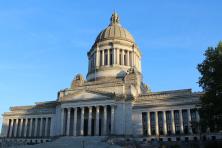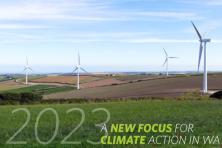These are interesting times for how we create and use energy in the US. At the national level, the current government is making a show of attacking policies intended to protect against pollution and climate change, and to shift our energy economy away from dirty energy. But at the same time, electrical utilities across the country are abandoning coal power in favor of clean alternatives. This trend reflects major victories for our climate and clean air – and for the many advocates of climate responsibility that have helped make this shift happen. We know now that we must complete a transition to 100% clean energy. That means replacing old, climate-damaging fuels with the cleanest possible sources of new energy.
Planning the future of Washington’s energy system is complex, balancing many interests and the long-term impacts and benefits. As today’s utilities retire massive polluting coal plants, they are too often replacing them with new fossil gas plants. Gas, touted as a “cleaner” alternative to coal, is another climate-polluting fossil fuel that will exacerbate, rather than solve, our growing crisis. In order to achieve our climate goals, we know we must drastically reduce our reliance on fossil fuels. Plain and simple, fossil fuels are risky business.
Right now, utilities in Washington state alone are planning to build new gas-fired power plants over the next two decades, capable of producing thousands of megawatts of energy. But we have the option NOT to simply swap one polluting fossil fuel for another. Thanks to a recent, bold decision from the Washington State Utilities and Transportation Commission we have an opportunity to stop the risky business and make a smarter investment in a clean energy future.
What made the difference: earlier this month, the Washington UTC directed utilities to incorporate the social cost of carbon into their planning processes. Climate change causes devastating impacts, such as deadly storms, increased flooding and drought, the spread of disease, and catastrophic health problems. Refusing to ignore those impacts—taking into account the social cost of dirty energy—places a monetary value on those threats and the risky business attached to fossil fuels. From here on out, utilities in Washington can no longer ignore those risks, and as directed by the UTC, must place them front and centered as they decide whether to invest in renewable energy or fossil fuels. The UTC’s decision will go a long way to protect us all against the risky investment of new fossil fuel development.
I am proud of our state for being determined to transition to a low-carbon future and for ensuring that all Washington residents will be able to breathe cleaner air, drink cleaner water, and be protected from the risk that fossil fuel investments pose. We have enough problems to worry about in times like these, and we don’t need additional risky business in our state.





